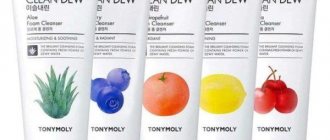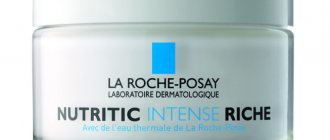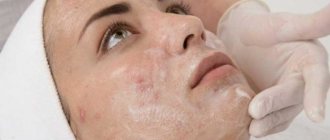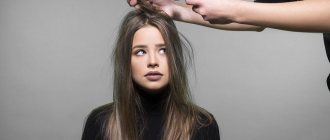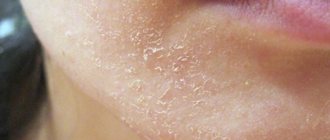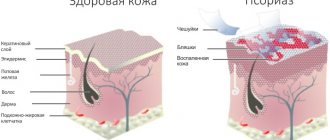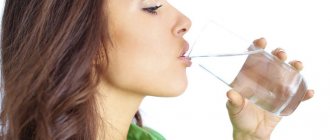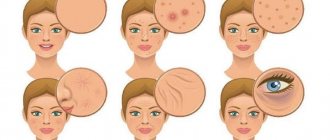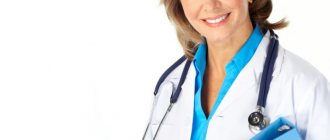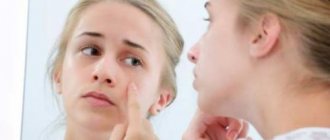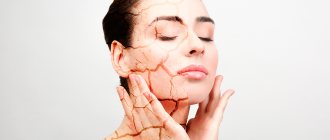Types of medications for acne treatment
Any medications must be prescribed by a doctor strictly according to indications.
You can’t just buy a drug at a pharmacy and start taking it. After all, every remedy has contraindications and side effects. And not all of them cope equally well with rashes on the face and body.
It is simply impossible to guess which pills help and which are completely ineffective on your own.
If a rash suddenly appears that does not go away for a long time, you need to consult a dermatologist and undergo examination by specialized specialists.
It is important to exclude diseases of internal organs, infections, allergies and other pathologies that cause acne symptoms.
Antibiotics
Prescribed to eliminate bacterial skin lesions.
Acne is often caused by excessive activity of pathogenic microflora - staphylococci, streptococci, propionic organisms.
Modern antibiotics have a wide spectrum of action. Some of them prevent the proliferation of microbes, others simply destroy them.
In any case, they are dispensed according to a doctor’s prescription, and the dosage and course of administration are determined individually.
Photo: antibiotics are prescribed in the presence of bacterial infection
Depending on the degree of the disease, therapy lasts on average from 7 days to several months. Erythromycin is suitable for treating mild forms, but in advanced cases more powerful agents will be required.
Levomycetin
It is used when other antibiotics are powerless.
- It is effective against gram-positive and gram-negative bacteria, causative agents of purulent infections.
- Levomycetin inhibits protein synthesis, penetrating the cells of microorganisms, rarely causing resistance.
According to the instructions, adults are prescribed 1-2 tablets every 12 hours 30 minutes before meals. The daily dose should not exceed 2 g.
The product is contraindicated during pregnancy and lactation, fungal skin infections, eczema and psoriasis.
Trichopolum
The active ingredient is metronidazole, which has a detrimental effect on the life of not only bacteria, but also protozoa.
- The drug is taken with meals for 7 days. The dosage is determined depending on the type of infection.
- Usually 1–1.5 g per day is prescribed, divided into 3 times.
Trichopolum is contraindicated in children under 6 years of age, pregnant and lactating women.
During treatment, it is forbidden to drink alcohol, as headaches, fever, and stomach discomfort may occur. An analogue for external application is Metrogyl gel.
Doxycycline
Refers to semisynthetic antibiotics of the tetracycline group.
Photo: a doctor must prescribe antibiotic treatment
The daily dose is 200–100 mg (1–2 tablets) after meals. It is important to take the medication with enough water to reduce esophageal irritation.
- The drug is not prescribed to children under 9 years of age during tooth development, as it leads to irreversible darkening of the enamel.
- During therapy, do not expose the skin to ultraviolet radiation or be in direct sunlight.
READ ALSO: Pimples on the pubic area - in women and men, causes, photos, purulent, red, why, big
Unidox Solutab
An analogue of Doxycycline, available in 100 mg tablets.
- It inhibits the metabolism and synthesis of bacteria, preventing their reproduction.
- The drug is well absorbed from the gastrointestinal tract, so its maximum concentration in the blood is reached 2 hours after administration.
It is not prescribed during pregnancy due to impaired formation of fetal bone tissue.
Minolexin
Also belongs to the group of tetracyclines and is most often used to treat acne and other skin infections.
Take 1 tablet of 50 mg per day for 6–12 weeks.
Retinoids
Retinoids are derivatives of vitamin A and its structural analogues.
- The composition of some of them is supplemented with an antibiotic. The drugs inhibit the growth of epithelial cells and the activity of the sebaceous glands, reducing the production of fatty secretions.
- They help with skin pathologies, but are also characterized by serious side effects. The patient may experience cracked and dry lips, pain in the muscles, joints and head, and bleeding from the nose.
The correct dose significantly reduces the risk of negative reactions.
Under no circumstances should you take retinoids uncontrolled.
Photo: retinoids are prescribed when other drugs are ineffective
The best of them are included in the list:
Medicines are not prescribed to pregnant women, breastfeeding, or simultaneously with alcohol and smoking.
Roaccutane
Stimulates the regeneration of skin cells, so it has proven itself in the treatment of acne.
It is prescribed when other drugs are no longer effective. Indications are cystic conglomerates, many purulent nodes and pustules prone to scarring.
After administration, the thickness of the stratum corneum of the epidermis decreases, which facilitates the penetration of the active substance deeper into the dermis.
In the infected area, inflammation decreases, the size of the sebaceous glands decreases, and comedones do not form.
Tetracyclines, vitamin A and some other drugs are not prescribed simultaneously with Roaccutane.
The daily norm is 0.5 mg/kg, but for body acne it is increased to 2 mg/kg.
Brewer's yeast
The safest anti-acne pills.
This beneficial supplement is suitable for teenagers, children over 12 years of age and adults. The composition includes carbohydrates, proteins, 14 vitamins, fatty acids, enzymes and minerals. It is a storehouse of zinc, iron, magnesium, folic acid, thiamine.
Photo: Brewer's yeast is often prescribed to teenagers
It is impossible to say with certainty whether beer shakes help with rashes.
But it is known for sure that as part of complex therapy they have a beneficial effect not only on the condition of the skin, but also on the health of the entire body:
- strengthen the immune system;
- increase resistance to infections;
- improve digestion and absorption of food;
- help eliminate harmful toxins.
You need to take the supplement 5 tablets 3 times a day 10 minutes before meals for a month, then it is recommended to take a break.
Aspirin
Acetylsalicylic acid does not get rid of acne if taken orally.
Photo: aspirin is effective when used externally
But when used externally, it has a therapeutic effect against acne.
- The tablets are crushed into powder, diluted with water to a thick paste and applied to problem areas.
- Leave the mask on for 15–20 minutes, then wash off.
- You can add honey, lemon juice, white or green clay, yogurt or kefir to the composition.
READ ALSO: Why acne appears in girls: causes, treatment
To cleanse the body
Unbalanced, poor-quality nutrition causes toxins to form on the intestinal walls.
They are absorbed into the blood and disrupt digestion. The skin tries to remove them through the pores, but in case of systematic poisoning it fails. The excretory ducts become clogged, and comedones and pimples form.
When treating acne, it is important to first cleanse the body of harmful substances.
There are special drugs for this.
Coal
Photo: mask with activated carbon
The sorbent is taken on an empty stomach at the rate of 1 tablet per 10 kg of weight.
It has no serious contraindications or adverse reactions.
Masks made from 2-3 tablets of charcoal, white clay and water absorb impurities from the surface of the skin well. The thick mixture is applied for 20–30 minutes and then washed off.
Lactofiltrum
Photo: colon cleanser
The composition includes lactulose and lignin, which promote digestion and elimination of breakdown products, normalizing peristalsis and stool.
Lactofiltrum stimulates the growth of beneficial microflora in the intestines and prevents fermentation and rotting of food.
The tablet is taken an hour before meals 2-3 times a day. The course of treatment is 2–3 weeks.
Analogs are Smecta, Sorbex, Polysorb, Enterosgel.
Effects of progesterone on the skin
During the premenstrual period, an increase in progesterone concentration leads to fluid retention in the body and activation of the processes of fat accumulation in the subcutaneous fat. In this case, the face becomes somewhat puffy, and circles may even appear under the eyes.
In addition, progesterone also affects the walls of blood vessels, significantly increasing their permeability. Due to this, the liquid part of the blood enters the tissues and causes some swelling.
After 50 years, sebum secretion in humans tends to level off, while in women it decreases, probably due to decreased ovarian activity. In both tests, no differences were observed between the two sexes. Skin elasticity, measured using a counter that measures the vertical deformation of the skin surface when a measuring probe is positioned, does not differ between the two sexes.
The dilatability of the skin is identical in men and women, but after hydration it only increases in women, and this is a consequence of the lower thickness of the dermis in women than in men. There were then differences between men and women in the metal content of hair. There are no differences in skin copper content in men, while an increase in age-related changes is observed in women.
The effect of progesterone on the skin contributes to the deterioration of its condition. It not only becomes overly stretchy, but also much more oily.
An increased amount of sebum contributes to clogging of pores and the development of inflammation. The penetration of infection into the deep layers of the skin is also facilitated by a decrease in local immunity. This is why in the second phase of the cycle, many women notice the appearance of pimples and worsening acne.
Men's skin, compared to women's, has a brighter color due to slight cell renewal and is darker due to both hormonal factors and differences in the content of melanin, hemoglobin and carotene. As a rule, in both sexes "the flesh becomes darker with" advance "age, but you can look at more complex options: from the end" learning the onset of puberty is progressive darkening in both sexes during adolescence, the skin of both is lighter, but more so in women . Simple hormonal effects cannot explain this difference, since both estrogen and testosterone tend to dull the skin rather than clear it.
It is also important that progesterone increases the sensitivity of pigment cells - melanocytes. Therefore, visiting a solarium or performing cleansing before the end of the cycle may lead to the appearance of persistent pigmentation.
When are hormonal pills prescribed for acne?
It turns out that hormonal drugs not only protect against unwanted pregnancy, but also cure acne.
After long-term use, the oiliness of the skin and hair decreases, the menstrual cycle normalizes, and the intensity of bleeding decreases.
But they are indicated only when the rash is caused by hormonal imbalances in the body.
If the cause of acne is different, then there will be no effect on the skin.
- Modern tablets are micro- or low-dose, so they do not lead to the development of such serious effects.
- They do not cause weight gain and hair loss.
These are Jess, Yarina, Janine, Diane-35, Belara, Mediana, Rigevidon, Logest and others.
For men
Hormonal pills for acne on the face are not prescribed to men.
- Contraceptives are not intended to treat acne.
- Indirectly, they have a beneficial effect on the condition of the skin and reduce the secretion of the sebaceous glands.
- But an excess of female hormones in a man’s body can lead to serious consequences.
What to do if a pimple appears on the labia minora? Find out here.
For women
For girls who have never had menstruation, such drugs are also not prescribed.
They are contraindicated during pregnancy and breastfeeding.
The most popular combination drug that suits most women.
It neutralizes sperm that have penetrated the cervix. Although ethinyl estradiol leads to weight gain and swelling, drospirenone reduces the likelihood of adverse reactions, relieves PMS, and reduces oily hair and skin.
Yarina
They are considered the most effective with a minimum of adverse reactions.
Photo: modern contraceptive
Thanks to the combination of two active substances, ovulation is inhibited and the viscosity of the uterine mucus increases.
As a result, the egg does not attach to the endometrium, and pregnancy does not occur.
The drug is modern and meets all quality standards.
It normalizes the activity of the sebaceous glands and prevents swelling of the face.
Janine
Low-dose hormonal drug with dienogest and ethinyl estradiol.
- Prescribed for pathologies of the reproductive system, accompanied by a decrease in the production of sex hormones.
- Like many other similar drugs, it provides contraception, regulates the menstrual cycle, reduces the intensity of bleeding, and the risk of iron deficiency anemia in women.
READ ALSO: Acne due to hormones: how they appear and how to treat them, says a gynecologist
Types and effects of hormones
ADRENALINE makes you feel full of energy. Known as the "fight or flight" hormone. Produced by the adrenal glands in stressful situations. The adrenal glands are supposed to release this hormone only sporadically, but modern, stressful lifestyles cause adrenaline to be produced regularly, causing the adrenal glands to become exhausted. Then the lack of adrenaline will be compensated by the overproduction of cortisol and testosterone.
CORTISOL is a hormone that is always present and leads back to adrenaline. Cortisol increases the acuity of all senses and makes you ready for “fight or flight” and has an inflammatory effect on the body.
SEROTONIN is the hormone of happiness. Helps you feel calm and relaxed and regulate your appetite. To ensure a sufficient amount of serotonin in the body, it is necessary to get enough sleep, since it is during sleep that this hormone is produced. So if your client doesn't get enough sleep due to stress or hot flashes at night, they will suffer from a lack of serotonin. Low serotonin levels also lead to melatonin deficiency.
MELATONIN works hand in hand with serotonin to help you sleep peacefully at night. Good sleep allows you to wake up with a sufficient supply of adrenaline and serotonin.
INSULIN is responsible for sugar levels.
Hormones influence our behavior and reactions. But what do we know about these hormones? During stress, the adrenal glands produce adrenaline, cortisol, and testosterone. Therefore, if a woman leads a stressful lifestyle, her adrenal glands become exhausted and begin to produce huge amounts of testosterone. This is the reason that determines the frequency of hormonal disruptions during stressful periods.
If the adrenaline supply is depleted, the person begins to act on cortisol, and the skin then becomes inflamed. You can forget about deep sleep - melatonin and serotonin will be at different levels, which means you will feel tired, exhausted and lethargic. In this case, most likely, a burst of energy will help, which will stimulate the production of insulin, which will lead to stress relief and activation of the adrenal glands.
This is how the hormonal “carousel” starts. These hormones will bind to reproductive hormones present in the body,
Other means
Photo: vitamins are prescribed as part of complex treatment
Vitamins and mineral supplements are prescribed as part of complex treatment.
- Zinc sulfate is necessary to normalize metabolic processes in tissues, accelerate wound healing, and eliminate inflammation. The trade name of the supplement is Zincteral.
- Omega-3 fatty acids are important for the body, improving the overall condition of the skin and reducing sebum production.
It is difficult to meet the daily requirement with food, so it is better to purchase capsules from the Evalar, Medicolight, and Doppelgerz brands.
What hormonal and non-hormonal causes most often provoke acne?
It is worth noting that very often several reasons can lead to the appearance of acne. For example, hormonal imbalance and poor nutrition; constant stress and disturbances in the gastrointestinal tract. Therefore, often to treat acne, visiting a cosmetologist is not enough.
Only a doctor can determine the source of the disorder, but in case of acne it is better to consult not only a dermatologist, but also a gynecologist and endocrinologist - these specialists will help identify the hormonal causes of acne:
- in the premenstrual period;
- excess androgens;
- disorders of fat metabolism.
In case of acne, it is better to consult not only a dermatologist, but also a gynecologist and endocrinologist.
Price
Table comparing the cost of hormonal acne pills in Moscow pharmacies
| Pharmacy name | A drug | Price, rub.) |
| Polart | Jess | 1035 |
| CityPharmacy | Yarina | 971 |
| Omega | Janine | 946 |
| Nova Vita | Diana-35 | 1039 |
| System | Rigevidon | 628 |
| Koptevskaya | Logest | 850 |
| Neo-farm | Belara | 691 |
What are hormones
Types of acne are hormonal, colds, deep, juvenile, pimples after shaving. How to properly treat acne
Hormones are biologically active substances that control the functions of the human body. There are more than a hundred of them. They are produced by many organs of the endocrine system - from the hypothalamus in the brain to the ovaries. These encrypted biochemical messages are designed to start or, conversely, stop certain processes.
Hormones enter the blood, which delivers them to the right place - to the target cells. Each hormone has its own cellular receptor. The hormone clings to it, and the cell receives a signal on how to behave further. There is no receptor or it is inactive - and the transmitted signal will not be received, no matter how many hormones are “sent on the task”.
Questions and answers
Despite the fact that it is strictly not recommended to self-medicate, many people go to the pharmacy rather than to the doctor for advice.
The reasons for this vary from lack of time to simple laziness.
But it is important to remember that many drugs should not be combined with each other.
Most of them are dangerous in case of individual intolerance or hypersensitivity.
Some, such as antibiotics, are addictive. And this can cause an increase in rash lesions. That's why you should think carefully before treating acne at home.
How to take hormonal pills
Start taking contraceptives from the 1st day of the cycle, that is, from the first day of the onset of menstruation.
Usually, the days of the week are already written on the back of the package for convenience. The tablet is drunk at the same time.
- If suddenly a dose is missed, then the girl, as soon as she remembers, should swallow the next dose. Even if you have to take two pills in a row at once.
- After 21 days, it is recommended to take a week break. For this purpose, in some packs 7 tablets out of 28 are placebo. Lasting results appear after six months or a year.
Which ones are better
It is impossible to say which hormonal agents are better, since each body is individual.
You should not buy the first drug you come across on the advice of a friend, even if she has the same symptoms.
You need to go to a gynecologist and together choose the most suitable one.
The doctor will observe whether the pills are suitable and whether there are any side effects.
If something is wrong, he will stop the medicine and recommend something else.
Types of acne, hormonal and non-hormonal causes of their appearance
It is worth noting that acne develops on the skin as a result of excessive sebum production and rapid keratinization of cells, which clog tiny hair follicles and provoke the proliferation of bacteria. The initial stage of acne development is microcomedone, which can disappear on its own or develop into one of the types of acne:
- whiteheads (non-inflammatory);
- blackheads (non-inflammatory);
- papules (inflammatory);
- pustules (inflammatory);
- cystic acne;
- nodes.
Among the triggers that cause disruption of the sebaceous glands and skin cells, experts identify the following causes of acne:
- hormonal;
- stress;
- lack of vitamins;
- disturbances in the gastrointestinal tract;
- inflammatory processes;
- taking medications.
Reviews
Girls highly praise hormonal contraceptives, as they have helped many get rid of acne and restore a healthy appearance to the skin.
Photo: review of the use of Diane-35
- I especially liked Jess, there were a lot of positive reviews. The drug is affordable for people with average incomes; it can be easily purchased at any pharmacy. There are complaints about Janine's pills: they cause hair loss.
Photo: review of the use of brewer's yeast
- After taking brewer's yeast, 80% of patients noted an improvement in the functioning of the digestive system, strengthening the structure of hair and nails, and increasing their growth. Self-treatment with antibiotics in half of the users led to the development of intestinal or vaginal dysbiosis and an increase in the number of rashes.
How to get rid of acne with aspirin? Find out here.
Is it possible to use Levomekol for acne on the face? Read on.
And during therapy, it is important to adhere to the doctor’s recommendations, not to exceed the prescribed dosage, and to complete the entire course. Only if these conditions are met will it be possible to defeat the hated acne for a long time.
Thyroxine and triiodothyronine
Thyroxine and triiodothyronine are hormones produced by the thyroid gland, the so-called energy hormones. Their function is to provide all cells of the body with nutrients and oxygen. Protein and lipid metabolism are also on their conscience, as are oxidative reactions in mitochondria. It is not difficult to guess that there will be a deficiency of such hormones. If the skin of the body and face becomes dry, tight, and the nose and limbs freeze with or without reason, it’s time to check the thyroid gland.
A blurry face shape, heaviness of the eyelids, hair and eyebrow loss are signs of the same problems. They are usually resolved by taking dietary supplements that contain iodine and by generally increasing iodine-containing foods in the diet.
Signs of hormonal acne
Hormonal acne in women is localized mainly in the face and less often in the upper torso. They are comedones and inflammatory elements (papulopustular rash). Acne in women can be single, which is typical for a mild stage of the disease, or multiple in the form of red bumps and pustules.
The most severe form is conglobate acne in the form of nodules and cysts, after resolution of which deep scars remain.
Acne due to hormonal imbalance is often accompanied by other symptoms of hyperandrogenemia: seborrhea, menstrual irregularities, excess male-pattern hair growth on the face, abdomen, around the nipples and arms.
There are many such reasons, let’s consider the most basic of them
- genetic (hereditary) reasons. Increased production of testosterone and the predisposition of the skin to react to it, as well as general hormonal levels, can be inherited. Therefore, one of the reasons for the appearance of hormonal causes on the face and body is a hereditary factor. Simply put, if both parents suffered from teenage acne in their youth, then their child should also expect similar skin problems during adolescence.
- Menstrual period in women. In the last phase of the monthly cycle in women, the level of the above-described steroid hormones can significantly increase. This explains the fact that more than seventy percent of women experience acne at the beginning of their period (for some these are isolated manifestations, and for others severe rashes).
- Violation of lipid (fat) metabolism. This happens when elevated levels of all types of lipids rise in a person’s blood: cholesterol, triglycerides, phospholipids and others. An excess of lipids overloads blood vessels, disrupting the blood circulation process, leading to various diseases. Hormonal imbalance is one of the causes of lipid metabolism disorders (for example, during menopause in women, or due to taking hormonal drugs such as corticoids, retinoids, anabolic steroids, progesterone, as well as hormonal birth control pills).
- Diseases of the pituitary gland and adrenal glands. Diseases that disrupt the functioning of these organs can cause hormonal acne in women and men.
- Gynecological diseases. This could be polycystic ovary syndrome, or hyperandrogenism (excessive production of male hormones in women) caused by pregnancy or abortion, and many other diseases.
- Stress. It has been proven that stress and depression can cause increased production of male sex hormones.
When is taking antibiotics justified?
Modern medicines have an impressive spectrum of action - some destroy pathogenic organisms, while others prevent them from multiplying. The dosage is determined individually.
In mild cases, taking Erythromycin will be sufficient, but more complex cases require the use of potent medications.
For example, Levomycetin is prescribed when other means are powerless. This drug is highly effective against purulent infection pathogens and bacteria. But it is prohibited to use it during pregnancy, during lactation and eczema, as well as in case of fungal infections of the skin.
Another well-known medicine is Unidox Solutab, which inhibits the synthesis of bacteria, which prevents their reproduction. But it is also prohibited to use during pregnancy, as it negatively affects the bone tissue of the unborn baby.
